A War Between The Man and 6,400,000 Insects
This article introduces how the tea garden ensures the quality of the tea without using any pesticides or chemical fertilizers.
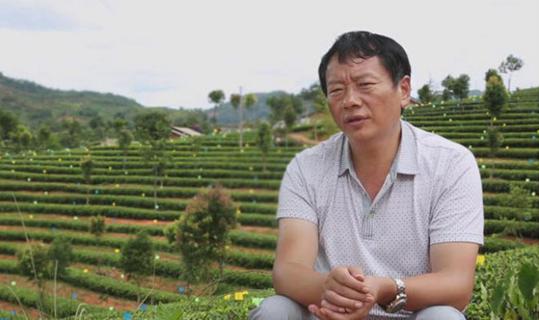
53-year-old farmer Dong refused to follow the mainstream of the times, do not use chemicals to deal with the natural, which may imposed on the risk of farming, such as diseases and pests.
He chose a more difficult path: in the rural areas where labor shortage is serious, they still mobilize a large amount of manpower to protect the tea garden in ways that do not harm nature; and at the same time, they accept supervision by more stringent export inspection systems, teas exports to many high quality markets Including the European Union, Japan and the United States. Dong has been insisting for 17 years.
The hardship of the minority road is that it can not take advantage of pesticides which is low-cost and high output, can not enjoy the relatively loose domestic pesticide standards.
In 2012, the Chinese NGO environmental organization Greenpeace released a survey: in the sample survey among 18 kinds tea of nine Chinese well-known tea brands, all teas contained at least 3 kind of pesticide residues, the most serious one has 17 kinds. 12 samples contained banned pesticides. Pesticide residue is the general situation for Chinese teas.
As a "rebel" , how does Dong keep his strength up against the current?
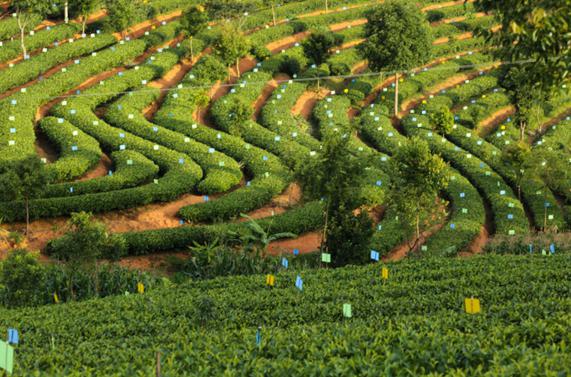
At Nanping Town, Pu'er City in Yunnan, most of the village farmers mainly plant tea for a living. Dong in the village has a 2500 acres tea garden, known as the "Dong Village".
Dong’s tea garden is not pure green, but colorful. The first time I walked into this tea garden, I realized it is strange. In the past three years, I have visited dozens of tea gardens,No one is the same as this one, this is special.
The whole tea garden, densely dotted with yellow, blue and green rectangular plastic plate, which about the size of two palms, fixed on the bamboo branches, about 50 cm above the tea bushes.

This is sticky board for pest controlling. It relies on insect phototaxis to attract and stick different types of insects. It is mainly against the small green leafhopper and thrip. Small green leafhoppers and thrips are sucking mouthparts insects, by sucking juice in the leaves for living. Biting leaves by small leafhopper is raw materials for one kind of famous oolong tea called "oriental beauty". But in Yunnan, this small insect is the disaster of tea leaves.
Sticky board is nothing special, it is a common tool for pests controlling. What’s difference is that all 2500 acres of tea garden covered by the sticky boards, total of 100 thousands.
The use of such large scale sticky boards, need a big extra cost. The sticky board with sex attractant cost 2RMB for each, 100,000 pieces of which costs 200,000RMB. Moreover, it needs a huge labor cost.
Each April, before the advent of the invasion of the small green leafhopper and thrips, 100,000 sticky boards must be inserted into the land. The manager of the tea plant told me that it needed five steps to settle one sticky board:1. cut the prepared bamboo; 2. insert it into the earth; 3. put the sticky board into the split bamboo, about 50cm above the top of the trees; 4. fixe the board on bamboo with nylon rope or wire; 5. ripe wax paper of the sticky board.

Sticky board is only valid for about two months. In the rainy season in August, rain will destroy the stickiness of the board. Like the film rewind, tea workers need to repeat the action to recycl the sticky board.
Dong like the ancient kings, efficient pest controlling system is the guardian of his kingdom, against foreign invasion and protect the tea garden.
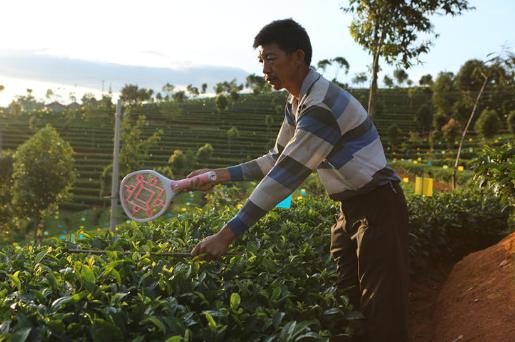
Sticky board is not enough. During summer and autumn there are too many flying insects, every morning and evening, workers with straw hats take tree branch in one hand and mosquito in another hand.
They swept over the surface of the tea tree branches, driving away the flying insects on the leaf bases and leaf stems, shot down these small insects immediately with electric mosquito.
In addition to 100,000 sticky boards, 1500 mosquito swatters, there are 125 insect lamps in the garden.
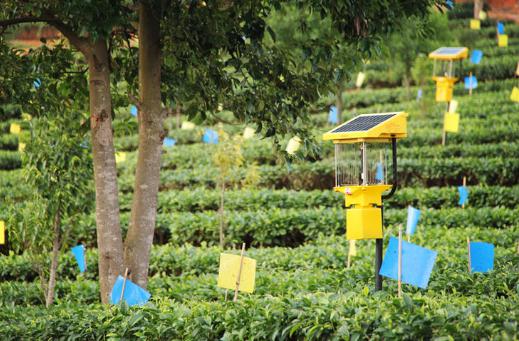
The lure lamps in Dong’s garden are bright yellow, like the chunky version of the street light, standing in the tea garden. During night, the lure lamps issue specific light, trapping moths, ladybugs and beetles.
The secret of Pest controlling system is a large number of available manpower, thanks to Dong’s ability of retaining people.
Now a large number of rural people find job in the city, retains people in a rural tea garden, it is not easy.
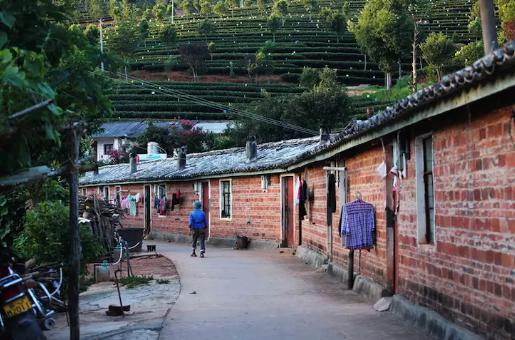
Dong almost changed the whole village. He built houses and roads beside the tea garden, like a self-built new small village. The workers are invited by Dong from far more rural areas.
The life in tea garden is not easy, only those from the far rural areas could stay and work here for years, maybe life long, skilled workers are important for an organic tea garden.
Dong, who grew up in this village, knows how things work here. " In fact, what the workers need is very simple, just respect, especially respect from leaders, They need to be listened to." Dong’s professional manager Li said, "how to deal with farmers, I completely follow Dong, he knows the peasants and the peasants obey him, because they followed Dong for years, and their life changed a lot: their were a Joke: flashlights were only shining tools at home in the old days, and now some children at home get married and can afford the car.
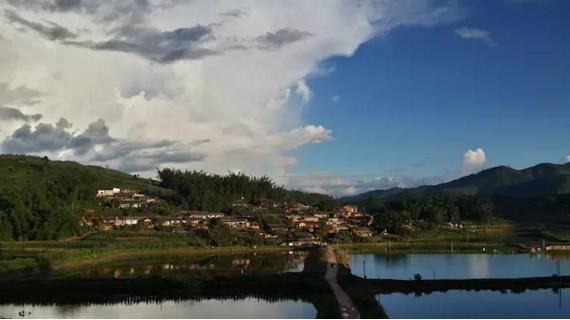
Nature does not favor this well-protected tea garden. It is fair and cruel. Dong’s tea garden had suffered serious pest in the first three years. Disasters in the tea garden stimulated the movement of catching insects.
It all started five years ago. It was drought in Yunnan that year. Flocks of tea moths grazed on tea leaves. Tea moths are particularly rampant in Dong's tea garden, because there were no pesticides that killing insects there.
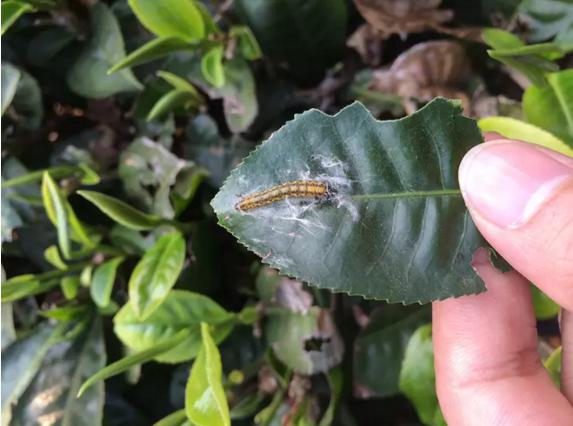
Tea moth is from Lepidoptera moth family, by eating tea leaves and stems for living. small larvaes silted the two leaves into a spindle-shaped, hidden within it and ate tea leaves, till grown up inside.
The disaster revealed signs at the end of February. More and more tea branches began withered and yellow because of insects biting. Look closely, two pieces of tea leaves curled together, the whole tea garden looks like burned by the flame.
"Even the path of the field were full of insects." When manager Li inspecting insects in the tea garden, saw insects ate out the leaves, like queuing, climbed over the path to another tree with leaves.
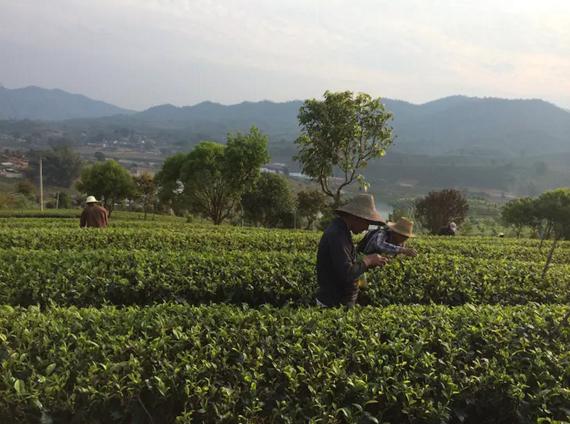
Tea workers stopped their job to catch insects in the tea garden. Their approach is hanging water bottles in the chest, decorated water. They checked the leaves and teared up the curled leaves, caught the insects out, dropped them into the bottle. The action carried out for two days, but no signs of slowing insects.
Dong’s family and tea workers felt flustered. "It does not work of Catching insects like this." Manager Li said "I felt even pesticides won’t work for such number of insects, it is frustrating”.
On night of March10th, Dong convened a meeting, intended to appease everyone's tension. The meeting held in an office right beside his house, which continued to 3am. 11 people sat around the 5 meters widen round wooden tea table, to discuss countermeasures. One worker suggested, "Can we use a bit of matrine, anyway, the EU unexpected it. If we do not do something, all the tea trees may be dead."
Matrine is extracted from the legume Sophora flavescens, an alkaloid that is naturally biodegradable. It is not on the list of tests in China, the United States and the European Union, but Japan has detection requirement about it.
"People from EU organic detection are bad, something can not be used today, and some others tomorrow. What if matrine can not be used someday? I just simply do not use any." Dong said.
Once the pesticide used in the garden, it is hard to be removed.
This is the twelfth year since Dong’s tea garden got the organic certificate. 90% tea from 2500 acres tea garden sold to Europe, the United States and Japan. Among them, the EU has the most stringent testing standards, and testing items are secret prevent tea farmers use other pesticides accordingly.
"Do not be afraid, I will take another 500,000RMB for catching insects by labors, we do not use any pesticide for sure." Dong said.
That night, Dong also decided to adjust the strategy of catching insects, organized all labors catching insects piece by piece instead of scattered state. At the same time promoted the two skilled worker’s method to all workers.

The method was found by Manager Li during inspecting in tea garden. One ordinary family generally could catch about 1500 insects each day, but there are two families could catch more than 3000, very efficient.
The secret of these two families is team work, men went to tea garden and collected curly leaves back with woven bags. Women and children at home stripped out the insects in the leaves, thrown which into the basin filled with water.
The method was work, coupled with the strengthening of management, insects gradually got under control.
From March 2nd to 28th, Dong launched a fight against the tea moth. In only 26 days,6.4 million 1519 insects were captured.
As if still in the era of cold weapons, they made it without any chemical weapons, only manpower. Tea workers, Dong’s family, students hired outside, total of more than 600 people, young and old, men and women, who all caught insects only by hands.
The scene of catching insects is spectacular. In the tea garden under the blue sky, you can vaguely hear insects biting the leaves. With the urging sound, more than 600 people picked off the yellow leaves on the branches quickly.
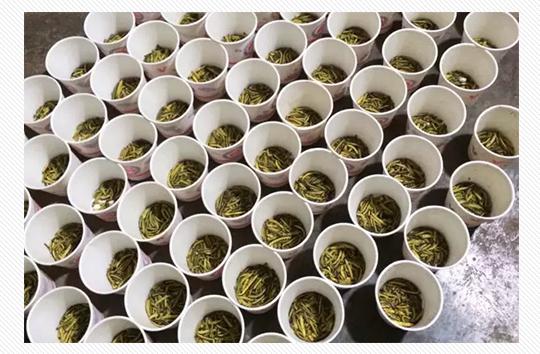
Totally 6,401,519 insects were captured in 26 days, an average of 246,212 per days. According to 5 cent per insect, it totally spent of 320,000RMB.
So far, artificial catching insects in March, September, and other times when insects were significantly increased is an regular practice in Dong’s tea garden.
Manager Li evaluated Dong with ”admirable”. He admired Dong's insistence. As a professional manager, he felt that making such a decision without considering the balance of payments needs for courage.

"It is not what typical business looks like, but like a bet." Manager Li said.
No pesticide cultivation and international organic certification is the ultimate goal for Dong. Seventeen years of efforts, Dong won his reputation.
"There is no way back." Dong said. He would love to insist on no pesticides and chemical fertilizers regardless of the cost.
In addition to spending 300,000 to 400,000RMB per year on catching insects, fertilizer is another big expensive. Chemical fertilizer is prohibited here with no doubt. In order to avoid the risk of heavy metal residues, feces of poultry from large farms can not be used. The most reliable source is sheep manure, cause Yunnan goats are free-ranging, running in the wild mountains.
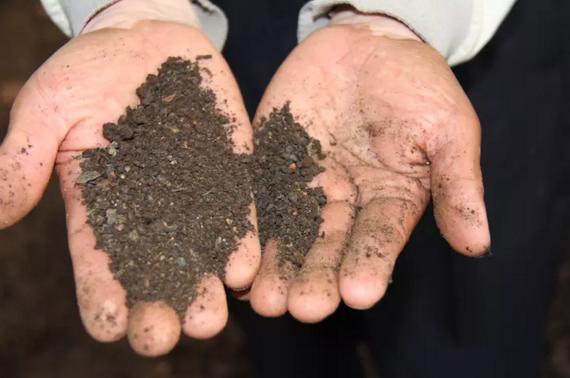
The organic fertilizer is processed by a specific factory chosen by Dong. The main components of which are 40% sheep manure, 20% humus, 25% green manure,10% oil residue, 5% sugar mire. This is an empirically formulation. Experts of China Agricultural University helped Dong to optimize the proportion of fertilizer this year.
Mixed all these raw materials together, it takes about two months to ferment to available fertilizer.
Humus and green manure (ie, fresh foliage, grass, legumes, etc.) are tea workers collected in the forest twice a year. Oil residue (residue left after tung seed oil extraction) and sugar mash (the jelly produced by the sugar mill) were purchased from the processing factory.
The sheep manure is brought from shepherd on the hill. Dong set up a special 31 people "goat manure acquisition brokers" team. People drive tractors into the mountain as far as they can, then wait for the shepherd sending the manure down by oxcart. Dong brought the sheep manures from the brokers, who earn the difference.
On average, each acre of land is fertilized twice a year, requiring about 1.5 tons of fertilizer. The cost of the fertilizer is 3400RMB per ton, the cost of fertilizer per acre is about 5,000 yuan annually. This figure multiplied by 2500 is the expenditure on the fertilizer.
Why chose such a cumbersome and expensive way to grow tea?
13 years ago, Dong ran a forest farm, and earned his first pot of gold, about 70 millions RMB. But the national policy changed later, he had to find a new business.
The next year he tried to run a hoggery, but he failed and lost of 100,000 RMB. It is not that he was bad at raising pigs, but the pork market uncertainty, the price has fallen when pigs grown up.
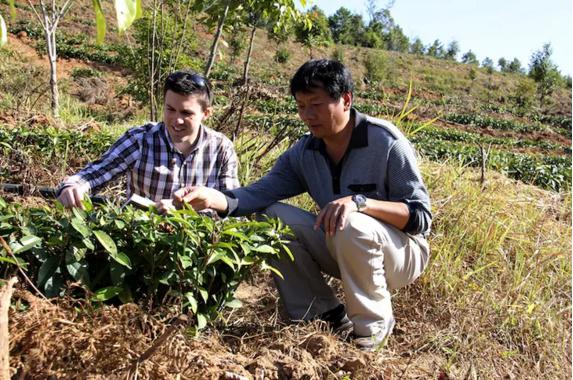
Dong quickly adjusted the direction. He decided to run a tea garden, do not use any pesticides or chemical fertilizers. At that time, he even did not know it was called organic. In the first three years the tea seedlings were failed to live, but he insisted on continuing to plant tea.
He said to his family, "we better sell things grown from the ground.’’ One Hong Kong businessmen he knew when he ran forest farm told him: you are from Yunnan, maybe you could run a tea garden to plant teas without pesticides and fertilizers. " Initially, Dong has only a small garden of 20 acres.
Manager Li analyzed the logic of why the proposal was adopted. The time during Dong ran forest farm, he met some elite people, who do business of valuable timber. People who does the timber business, knows that one piece of mahogany equals to 100 ordinary woods. "They know the value of high quality." Thanks to his business experience of early years, Dong has a great experience than most of ordinary farmers, He believes that the tea without pesticide and chemical fertilizer is more valuable, which could win the future of the tea market.
Farming is what Dong and his employees from the forest farm good at. "They are born to be farmers, have a natural sense of intimacy with the land-related business without fear.
This choice is rational, before running the tea garden, Dong specifically invited experts to investigate if the land and the climate is suitable for the growth of tea. Lucky, he got a positive answer.
Once Dong make a decision, he rarely changes his mind. Stubborn is what people evaluated him from whom I interviewed.














